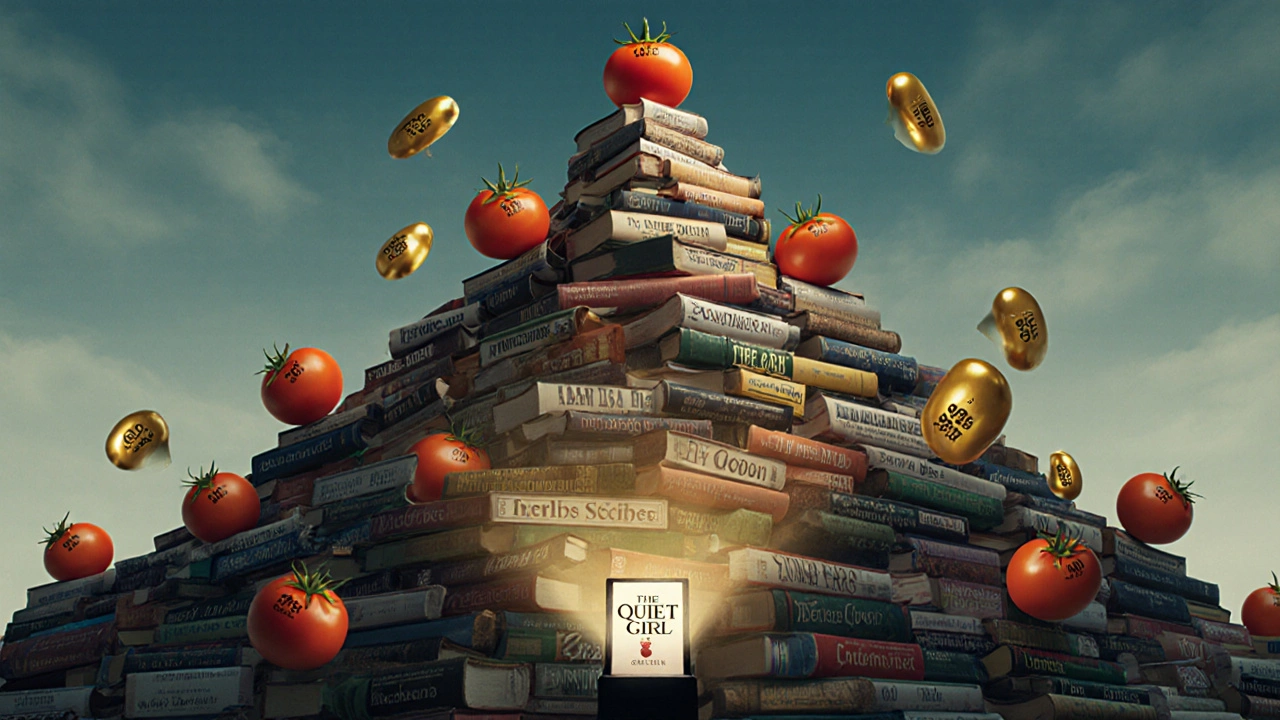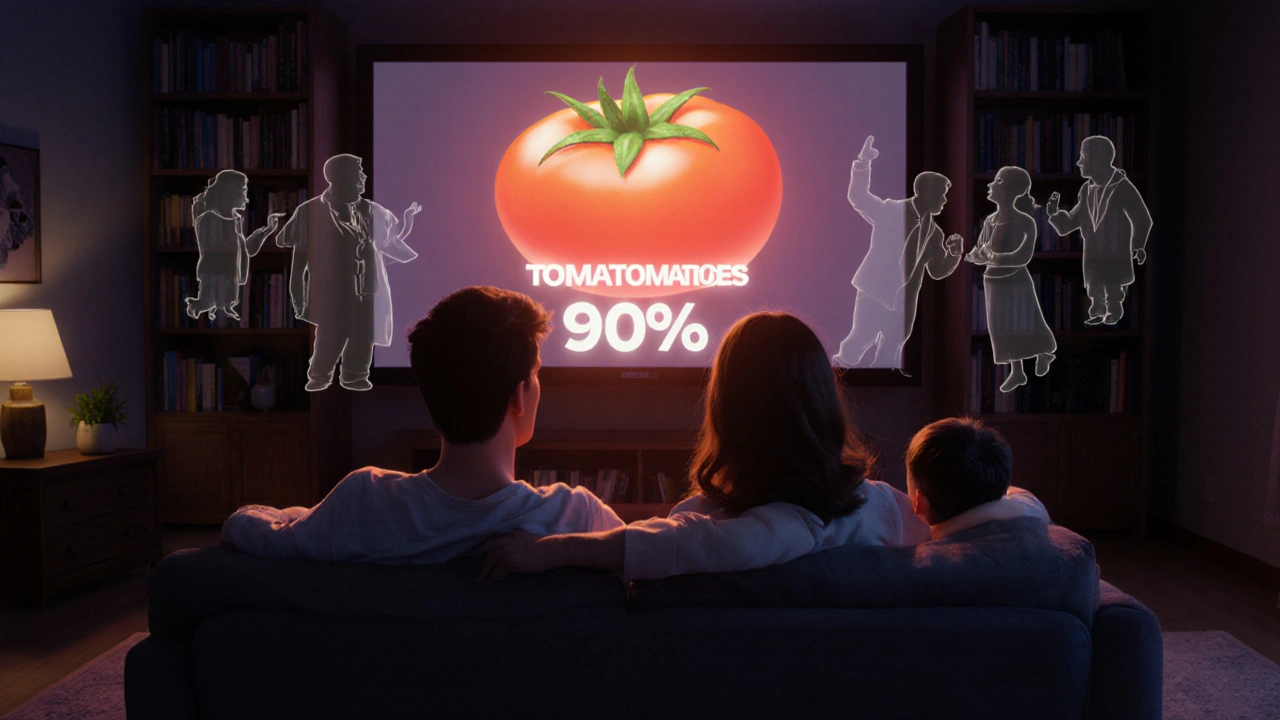Every year, around late November, movie fans and critics alike lean in to see what Rotten Tomatoes has to say. Not because it’s perfect - but because it’s the one system everyone talks about. The Golden Tomato Awards don’t just list the highest-rated films and shows. They reveal which ones truly connected, which critics stood behind, and which titles became cultural moments - not just because of box office numbers, but because of pure, unfiltered approval.
What Exactly Are the Golden Tomato Awards?
The Golden Tomato Awards are Rotten Tomatoes’ annual roundup of the best-reviewed movies and TV shows, based entirely on critic scores. Unlike audience ratings, which can swing wildly based on fan loyalty or meme culture, the Golden Tomatoes are built on the aggregated scores from professional reviewers. To qualify, a film or show must have at least 80% approval rating from critics, and a minimum of 40 reviews for movies or 20 for TV series.
It’s not about how many people watched it. It’s about how many critics said it was good. That’s the core rule. A $200 million superhero movie with a 79% score doesn’t make the list. But a quiet indie drama with 85% from 65 critics? That’s a Golden Tomato.
Each year, Rotten Tomatoes breaks the awards into categories: Best Movie, Best TV Show, Best Genre Film (Action, Comedy, Horror, etc.), and Best International Title. The winners aren’t chosen by a panel. They’re calculated by algorithm - pure data, no bias, no lobbying.
How the Score Is Calculated
The Tomatometer isn’t an average. It’s a percentage of positive reviews. If 87 out of 100 critics gave a movie a score of 6/10 or higher, it gets an 87% rating. That’s it. No weighting. No extra points for big studios or famous directors. A critic from The New York Times counts the same as a critic from a small regional paper.
There’s one twist: reviews must be published within the calendar year. A film released in December 2024 won’t count for the 2025 Golden Tomatoes. That’s why you’ll sometimes see last-minute releases suddenly climb the charts in November - they’re eligible for the current year’s awards.
For TV shows, the rule is stricter. Every episode must have a critic review, and the season’s overall score is the average of all episode scores. A single bad episode can drag down a whole season, even if the rest are brilliant. That’s why shows like Succession and The Bear keep winning - they’re consistent.
Why Critics Matter More Than Audience Scores
You’ve probably seen the split: a movie with a 95% Tomatometer and a 40% audience score. That’s not a glitch. That’s the point.
Professional critics are trained to evaluate storytelling, direction, cinematography, editing, and thematic depth. They watch dozens of films a year. They compare new releases to classics. They look for innovation, not just entertainment.
Audience scores? They reflect mood. A fun action movie might get a 90% audience score because people loved the explosions. But if critics found the plot lazy and the characters flat, the Tomatometer stays low. The Golden Tomato doesn’t care if you had a good time. It cares if the film did something meaningful.
That’s why Oppenheimer won Best Movie in 2023. It wasn’t the highest-grossing film that year. But critics saw it as a rare blend of historical weight and cinematic ambition. It had a 93% Tomatometer. Audience score? 84%. The Golden Tomato went to the critics’ choice.

How the Winners Are Selected
Here’s how the process works behind the scenes:
- Every eligible film or show is tracked from its release date through December 31.
- Each review is assigned a binary value: positive (6/10 or higher) or negative (below 6/10).
- The percentage of positive reviews is calculated.
- Only titles with 80% or higher qualify for consideration.
- Among those, the highest-rated in each category wins.
- Ties are broken by the number of reviews - more reviews = higher credibility.
That’s it. No voting. No jury. No studio influence. Rotten Tomatoes doesn’t even contact studios before announcing winners. The data speaks.
In 2024, The Brutalist took Best Movie with a 96% Tomatometer from 127 reviews. The runner-up? Wicked at 91%. The difference? 1,000 more critic reviews for The Brutalist. The award went to the film with the strongest consensus.
What Winning Means - And What It Doesn’t
Winning a Golden Tomato doesn’t guarantee box office success. Past Lives won Best Drama in 2023 with a 98% score. It made $12 million worldwide. John Wick: Chapter 4 made $400 million. But only one got the Golden Tomato.
It also doesn’t mean the film is for everyone. A movie like Anatomy of a Fall won Best International Film in 2023. It’s slow, dialogue-heavy, and requires patience. But critics called it a masterpiece. The Golden Tomato recognized that.
What it does guarantee? That the film or show was held to a high standard by professionals who’ve seen everything. If it wins, it means it passed a real test - not popularity, but quality.

How to Use the Golden Tomato Awards
Don’t treat them like a checklist. Treat them like a compass.
If you’re tired of algorithm-driven recommendations on Netflix or Hulu, the Golden Tomato list cuts through the noise. It tells you what critics, not marketers, think deserves your time. Use it to find hidden gems you might miss - like The Quiet Girl (2022), a tiny Irish film that won Best International Movie and ended up on more critics’ top-ten lists than any Hollywood blockbuster that year.
Use it to challenge your taste. If you love action movies but always skip dramas, check out the Golden Tomato winners in Best Drama. You might find something that changes how you think about storytelling.
And if you’re a parent, teacher, or just someone looking for something meaningful to watch with a friend - skip the trending list. Go straight to the Golden Tomato winners. You won’t waste an evening.
The Bigger Picture: Why This System Still Works
Some say Rotten Tomatoes is outdated. That algorithms, TikTok, and YouTube reviews have replaced critics. Maybe. But here’s the truth: no algorithm can replicate the trained eye of someone who’s watched 300 films a year and knows the difference between clever and shallow.
The Golden Tomato Awards work because they’re simple. They’re honest. They don’t try to be everything to everyone. They’re a filter - not for what’s popular, but for what’s well-made.
And in a world full of noise, that’s worth something.


